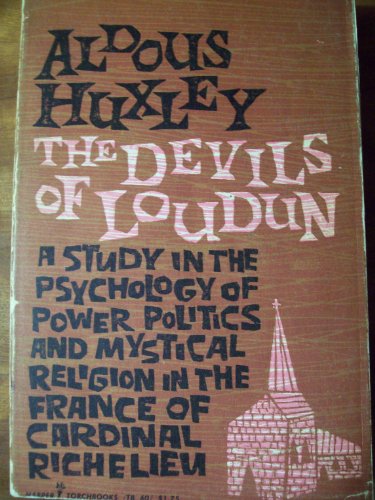-
A Life of Jesus
Edgar J. Goodspeed
Paperback (Harper&Row/Harper Torchbooks, March 15, 1970)The story of Jesus and how he flashed like a meteor across the sky of his generation, and this world, cannot be told too often. Here then is a book which is the product of mature Biblical and historical scholarship, but it is also a trumpet call to faith. Reading it is a religious as well as an educational experience.
-
The Black Death
Philip Ziegler
Paperback (New York Harper Torchbooks, March 15, 1983)None
-
THE DEVILS OF LOUDUN
Aldous HUXLEY
Paperback (Harper Torchbook, March 15, 1959)THE DEVILS OF LOUDUN [Paperback] [Jan 01, 1959] HUXLEY, Aldous ...
-
A Fool's Errand
albion W. Tourgee
(harper Torchbooks, July 6, 1966)John Hope Franklin: "The value of A Fool's Errand lies in its fearless criticism not merely of the South for its post-[Civil] war attitudes and policies but of the national governmental problems raised by the war and its aftermath. At a time when public sentiment tended to frown on anything that might exacerbate the intersectional difficulties, Tourgee insisted on discussing the problem, because he was convinced that it had not been solved satisfactorily, or indeed, at all... "In his understanding and interpretation of Reconstruction Tourgee would even today be regarded as a radical. Over and over again he emphasized the fact that in the years immediately following the Civil War the former Confederates had control of their own state governments. It was during this period, he argued, that they clearly demonstrated their unwillingness or inability to face up to the implications of the surrender at Appomattox. "... As an intelligent observer and participant in Southern Reconstruction, Tourgee was in an excellent position to provide his contemporaries and posterity with an important commentary and criticism of what he witnessed and experienced. He was a pioneer post-war social critic."
-
Jinx: The Wizard's Apprentice
Sage Blackwood
Paperback (New York: Harper, Aug. 16, 2013)Jinx
-
Giants in the Earth: A Saga of the Prairie
O. E. Rolvaag, Lincoln Colcord, Einar Haugen
Paperback (Harper Torchbooks, March 15, 1964)None
-
A Life of Jesus
Edgar J. Goodspeed
Paperback (Harper Torchbook, May 9, 1905)Writing on inside covers first page. Inside is gently used. Outside cover does have some scuffing along corners and edges with slight creasing and a very small tear at bottom of front cover is it.
-
Comedy Girl
Ellen Schreiber
Hardcover (Harper, New York, Aug. 1, 2004)None
-
Antic Hay & The Gioconda Smile
Aldous Huxley, Martin Green
Paperback (Harper Torchbooks/Harper & Row, Jan. 1, 1964)Paperback
-
Magical Adventures of Pretty Pearl, The
Virginia. Hamilton
Hardcover (New York, Harper [, Aug. 16, 1983)None W
W
-
Twilight land
Pyle Howard 1853-1911
Paperback (New York : Harper, March 15, 1922)None
-
A Doffed Coronet; a True Story...
Marguerite Cunliffe-Owen
(New York Harper, Jan. 1, 1902)None